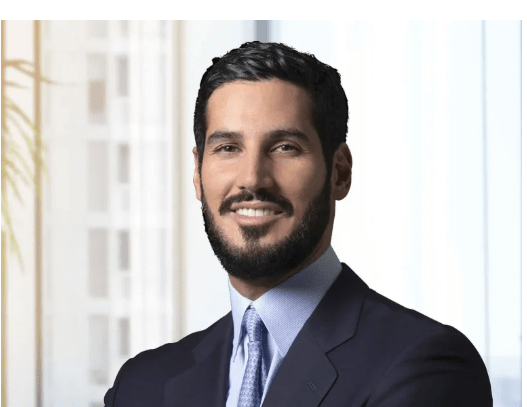The estimated $1.9 billion in net worth of Hassan Jameel attests to both inherited wealth and very successful management of a multinational company. He oversees operations in over a dozen nations, from Asia Pacific to North Africa and Turkey, in his capacity as Vice Chairman and Deputy President of Abdul Latif Jameel. The company’s long-term strength is its exclusive rights to distribute Toyota automobiles in Saudi Arabia. His grandfather made this agreement in 1955, and it has since developed into a highly effective basis for a diverse corporate portfolio.

After attending London Business School and subsequently receiving training at Toyota Motor Corporation in Japan, Jameel formed a viewpoint that is quite similar to that of other global heirs who strike a balance between exposure to foreign cultures and their local history. His capacity to adapt was greatly enhanced by this experience, which enabled him to steer a legacy business into the fields of energy, finance, and real estate while maintaining the remarkably resilient automobile section. In line with Saudi Arabia’s Vision 2030 changes, which have considerably decreased reliance on traditional oil-centered riches, the business has made considerable investments in renewable energy during the last ten years.
Hassan Jameel – Key Information
| Detail | Information |
|---|---|
| Full Name | Hassan Mohammed Abdul Latif Jameel |
| Date of Birth | October 22, 1988 (Age 36) |
| Nationality | Saudi Arabian |
| Education | MBA, London Business School; trained at Toyota Motor Corporation, Japan |
| Current Position | Deputy President & Vice Chairman, Abdul Latif Jameel (Saudi Arabia) |
| Net Worth | $1.9 billion |
| Business Interests | Automotive, real estate, energy, finance, environmental initiatives |
| Philanthropy | President of Community Jameel; partnerships with UNHCR; education, health |
| Media Attention | Formerly linked to Rihanna, global music icon |
| Residence | Saudi Arabia |
| Authentic Resource |
Jameel’s impact goes beyond business through his charitable endeavors. In his capacity as President of Community Jameel, he has backed projects that range from groundbreaking efforts in healthcare and education to refugee aid with UNHCR. The foundation has promoted job development, supported research institutions, and fostered sustainability innovation through strategic partnerships. His dedication goes beyond simply writing checks; it reflects a more general belief that duty comes with riches. In the Middle East, where billionaires are increasingly viewed as custodians of social welfare and economic diversity, this mindset is especially novel.
In popular culture, however, his story has a different resonance. His connection to Rihanna catapulted him into international spotlights in recent years. Even though the relationship ended, it brought to light the intriguing conflict between fame and privacy. Known for his modest discretion, Jameel almost immediately became the focus of tabloid attention. The relationship was quite comparable to how obscure European nobles are made the center of attention when they are romantically associated with famous people. This publicity did not damage Jameel’s reputation; rather, it brought to light the sharp contrast between his modest living and the glitzy world of pop culture.
Despite having a legacy, his wealth has significantly increased because to diversification and a proactive approach. Jameel has shown a remarkable grasp of where opportunities are in the future by diversifying into clean energy, infrastructure, and environmental projects. This change has been incredibly successful in a time when corporate language is dominated by sustainability, solidifying Abdul Latif Jameel’s standing as more than just a car dealer. It has developed into a highly adaptable corporation that can change its form as markets do.
Jameel is especially captivating because of his ability to transition between charity settings and boardrooms with ease. His involvement in intellectual and cultural exchanges outside of business is demonstrated by his position on the University of Tokyo’s Global Advisory Board. This role demonstrates a willingness to stay rooted in communication, education, and teamwork in addition to status. He has expanded the power of his family and his own legacy by making use of these relationships.
More than just personal wealth is represented by Jameel’s presence in the framework of Saudi Arabia’s unfolding changes. He represents the new breed of Saudi leaders who are well-educated outside, culturally savvy, and fervently committed to advancement. People like him serve as both drivers for change and symbols of continuity, showing how riches may be transferred from one generation to the next for philanthropy, innovation, and international cooperation. His story is incredibly trustworthy as proof that family enterprises can grow into major participants in the world while maintaining their roots if they are led by a clear goal.
His quiet public demeanor contrasts with that of more vocal billionaires, as observers frequently observe. In contrast to Elon Musk, who thrives on continuous public interaction, Jameel keeps a quiet profile so that his work speaks louder than him. This discretion increases his authority rather than lessens it. His personal life’s mystery adds to the interest and serves as a reminder to society that having money does not always equate to constant approval. His charity endeavors and financial decisions continue to be the more obvious markers of his values, offering a leadership example that feels especially creative in its moderation.
For those who only consider numerical metrics to gauge influence, $1.9 billion is already remarkable. However, net worth just provides a portion of the picture. Jameel’s influence comes from his capacity to influence companies, provide funding for charitable endeavors, and represent the meeting point of modernity and tradition. His story demonstrates that having money is insufficient; what makes that money meaningful is being driven, forward-thinking, and involved in society. His career serves as an example of how legacy and strategic foresight can help organizations adjust to global change much more quickly than startups that are still trying to find their identity.
